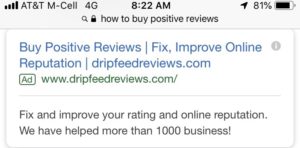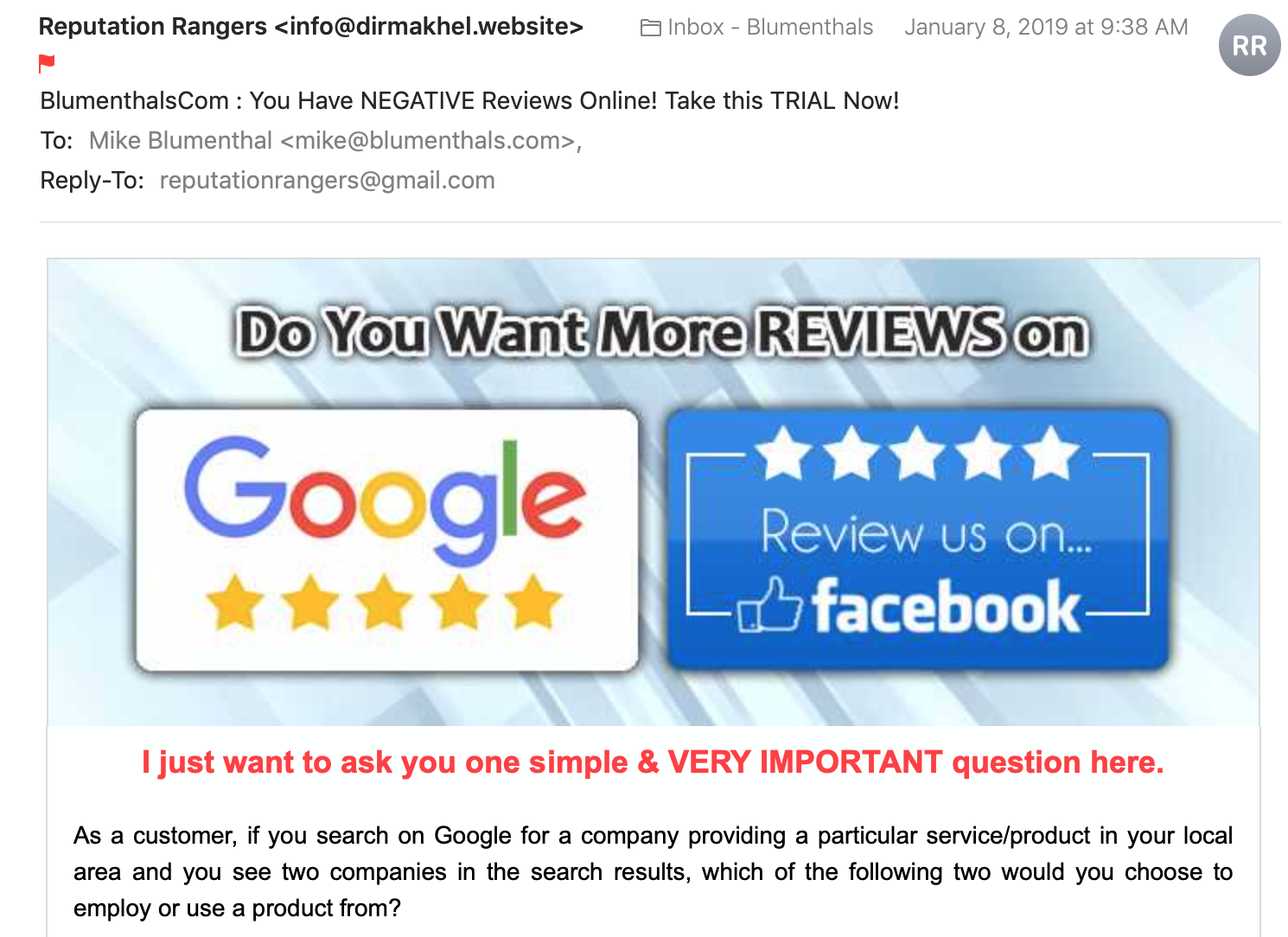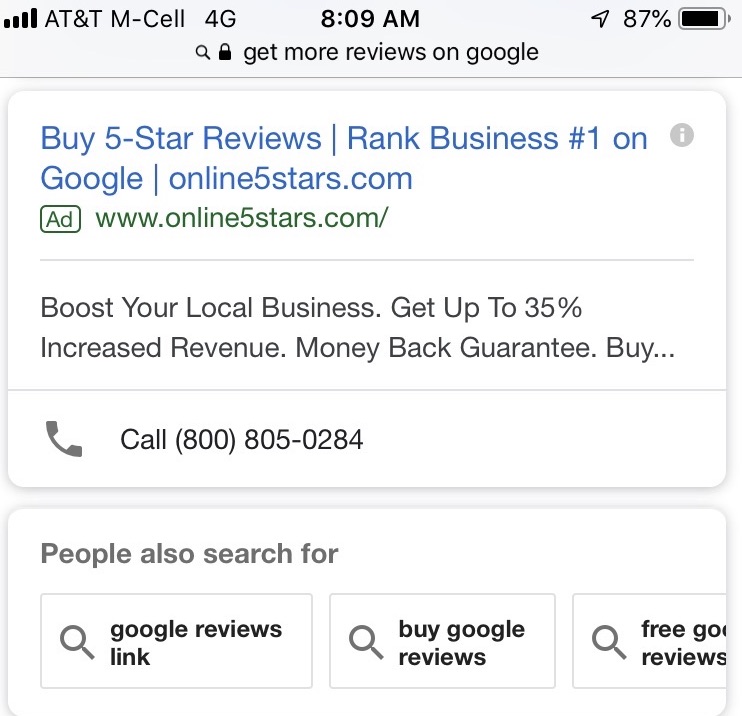Understanding Google My Business & Local Search
How Google Helped Foster the Fake Review Economy and Benefits from It
 Fake reviews are a long term AND growing problem at Google. The unfortunate reality is that Google helped create this illegal market place and benefits from it economically.
Fake reviews are a long term AND growing problem at Google. The unfortunate reality is that Google helped create this illegal market place and benefits from it economically.
Google has, over the years, created both new opportunities in existing markets AND created new market opportunities.
And Google often touts the economic benefits that it brings to society. In fact Google claims that “last year, Google’s search and advertising tools helped provide $283 billion of economic activity for more than 1.5 million businesses, website publishers, and nonprofits nationwide”.
Unfortunately Google doesn’t much care whether the activity created is legal. And they only proactively go after illegal activity once it has become a visible public relations problem.
The drug rehab space comes to mind (although there are many other previous and current examples). Google did very little until the Verge expose by Cat Ferguson brought national attention to the abuses of needy people by unscrupulous Rehab Centers in the fall of 2017.
This pattern of market creation and profiting from illegal activity on Google’s part is no where more true than with fake reviews.
– Google created search results that favor businesses with more reviews.
– Google has rarely created significant barriers to fake reviews, often allowing them at massive scale.
– New businesses sprang up to help local businesses get more, often illegal, reviews. It would appear from the scale and increasing frequency that this has become a criminal enterprise that includes threats and retaliation to those that report them.
– Google supports a vibrant market place for businesses to sell fake reviews using Google’s organic, email, video and ad platforms.
– Google profits from this illegal marketplace by selling AdWords into the space
– Google has done little to dampen or eliminate the fake review market despite the fact that it is both against their terms of service and a violation of state and national laws. And Google externalizes the costs associated with identifying the spam review to volunteers.
– While there has been some limited public relations blow back on the review front, Google has not yet put in place adequate filters for fake reviews, does not filter these illegal results from their search engine and apparently has not enforced rules in Adwords that prohibit advertising their acquisition.
– Ultimately, after years of neglecting growing problems, when the spam gets so bad that it makes the product worthless, Google tends to throw up their hands and create a pay to play product like Local Service Ads or Google Shopping.
It really doesn’t matter where you look on Google, the activity to sell fake reviews is obvious and easy to find.
Last week, a Gmail user solicited me to buy illegal reviews. I had a long and interesting back and forth with him (I assume it is a him) about the quality and reliability of his product. He notes that he only uses long standing Google accounts and can thus guarantee that he can get me reviews every month .
All the accounts that we use to post the reviews are 6-10 years old that we have been maintaining as a real person would do, that is why we are able to maintain more than 95% success rate with the reviews we post and that is what makes the reviews look organic and real.
After some negotiation, he guaranteed that he could provide me with 10 Google reviews every month on his subscription plan for only $50. And the first month was free!
Search Google for buy fake reviews and while the first few results are why you shouldn’t buy them, I am sure that the organic result in the number 4 position gets most of the click throughs.
A quick search on YouTube finds fake review offers at the top of the results.
Never one to leave a new market place untapped, Adwords continues to provide opportunities for businesses to sell into the space. And for Google to profit from this activity.
Google lives in a very strange world, with near categorical protection from use of their platform by bad actors, only reacting when a problem becomes so big that they have to respond or face the wrath of the public and the government.
Fake reviews certainly warrant a response from Google. Legitimate businesses are hurt every day and more importantly consumers world wide are deceived. And yet they continue to act as if it isn’t a critical issue.
Google’s failure to act decisively in the review space, now that they are THE local monopoly and dominate the review space, will ultimately decay consumer trust in reviews and lead to the failure of reviews as an alternative to traditional word of mouth.
What will it take to make them respond? It remains to be seen.
© Copyright 2025 - MIKE BLUMENTHAL, ALL RIGHT RESERVED.




Comments
23 Comments
I tried to do my part by ranking #1 for buy fake reviews, my CTR is appropriate, but the bounce rate is hiigh….
Fake Google reviews are a huuuuuuuuge problem. I do hope the highlighting of this issue will compel Google to act accordingly: GOOGLE, you are being gamed… and and the rest of us spend all kinda of time and money dealing with the mess.
Good article Mike – very comprehensive. The continuous light you and everyone in the industry shine on this issue will hopefully make a difference someday. Until then, #Yelp will remain the single most trusted source for authentic review content.
@Rich
While Yelp does do some things right, their algorhythmic bias towards negative reviews create a different set of systemic biases.
Amen!
Agreed, and I tend to trust Yelp reviews more than Google reviews. With one purchasing decision I even went as far as to reach out to someone that left a review for a service provider I was considering to hire. IMO that’s a nice feature Yelp has that Google doesn’t offer.
You said exactly what I was thinking, Rich H. – Here we are all making sure to do what Google wants, making sure everything is natural and relevant for the searcher…
Mike, perhaps you know about the work Jaron Lanier has been doing on the dehumanizing effects of social media. One of his big points is that Facebook’s IPO created a new type of valuation based on time spent on a site by users, which established a strong incentive for public internet companies to look the other way when it comes to bots and fake users. He also claims it was a big mistake, in the early days of the internet, not to establish a format for people to verify their identify, though at the time it was a well-intentioned decision that had to do with protecting individual right to privacy, freedom of speech, and so on.
On the topic of reviews, I do wonder whether Google’s fake review problem is anywhere near as bad as Amazon’s. Certain Amazon product categories, like consumer electronics, seem to have been completely taken over by spammy “verified purchase” reviews designed to drive up the product’s ranking.
@Damian
While identity would help, reality is that Google already has a pretty good idea of who actually visits a business, what abusive patterns are and could do a much better job of making bought reviews worthless or less visible.
And while I am sure that Amazon has review problems. that is in no way a defense of Google. Just because neither Amazon nor Google have invested adequately in the space doesn’t forgive Google from not having done so.
With Section 230, there is virtually no motivation for them to do so.
Right, didn’t mean to suggest Google was less culpable, only that as a user, I get the impression that Amazon’s fake review problem is even worse.
We just recently experienced this whole fake review fiasco and while the problem was resolved, we still had to spend a lot of time to get to the bottom of it.
It’s not ideal for business owners who do not spend a lot of time online and wouldn’t notice the reviews right away though.
Your article is excellent. There is another side of the coin though, and IT’S JUST AS BAD!! Your post illustrates how fake reviews can be purchased to boost ranking; the other side of the coin is ANYONE and I mean ANYONE can leave a poor review with ANY business, even if they had no dealings with the company of any kind. That 1-star rating penalizes the business owners website. It’s not a very big deal when you are a large business with lots of reviews but with small, tiny companies who don’t get many reviews; it’s an outright scam!! GOOGLE REFUSES TO DO ANYTHING ABOUT IT!! That tells me that they SUPPORT IT!
Just this past month two of my clients received several 1-star reviews from people who have never used their services. If you report it, there are what seem to be robots on the other end of the phone that just say “It does not violate Google’s policy!” Okay, get me to someone further up the chain then; “It does not violate Google’s policy!”
This is totally unacceptable. I’m sure something is being done about this but currently GOOGLE SUPPORT POOR RATED REVIEWS BY PEOPLE WHO NEVER USED THE SERVICE!! That must mean they support it!
The SEO community has been ranting about this for quite a while ( rightly so ) and it’s frustrating to see no real effort at improvement. You make an interesting point about the value of reviews being potentially eroded as these practices are allowed to continue. However, social proof was being manipulated long before the internet so.. who knows..
What is this new B.S. that Google is doing, the “Local Guides”? I do marketing for a small, family owned veterinary practice and they are getting reviewed by “local guides” who are not their patients and who have never visited the practice. I suspect some of them don’t even live in the same state, and at least one of them is using a fake name.
Thanks for bringing this conversation to life! We all depend on reviews and corruption will kill our trust in what we depend on to buy/behave online.
How do we make a bigger case for it? What about if each one of us writes a post on our business blog and creates a hashtag around it…bringing this subject to the forefront in the same way fake news got the spotlight.
Gathering up some PR folks too to get this conversation at the forefront?
Nice article. Sorry I missed it when published last month.
Over the last 6 months I’ve run into some review ratings on Google I thought might have been the targets of fake positive or negative reviews relative to other sources of info on the SMBs. That was random and anecdotal. I started to think fake reviews might be proliferating.
But admittedly that is random and I made no effort to check further.
Over a year ago (I believe I made you aware of 2 smb’s I knew were obtaining fake reviews) I went on a “crusade” to get fake reviews from these 2 smb’s. By hand I provided google with the reviews and profiles of the reviewers (and found some other smb’s that were benefiting from those fake reviewers). My reporting was by hand and it took considerable time. After removing possibly 50-70 google stopped removing them leaving possibly a total of 2-300 reviews of which at least 85% were faked by accounts that had to be being paid to generate 5 stars to paying customers. ( the same smb’s kept getting the same 5 stars from the same google accounts/people)
So the 2 smb’s have around those 2-300 reviews plus it appears another 10-20 in the last year. These 2 smb’s have high 4+ rankings.
Now I happen to know the niche as we own similar smb’s. From interviewing our customers over many years we have a good estimate as to what % buy based on high review rankings.
I can only estimate their sales based on the size of the markets they are in and our experiences in large and smaller markets, but when I multiply the % of customers who buy b/c of high rankings against possible total sales I sense around 6 figures of additional annual income against a one time expense of maybe $900. (300 reviews x $3/ review. (Btw I am in an FB review swap group as I was curious as to how widespread fake review buying was. There are offers every day, more recently multiple offers a day and of recent I’ve seen google and FB fakes prices at about $1/review)
The long and short of it is that I suspect the smb buyers of the faked 5 stars did freaking great on a return on investment. Additionally as they keep that high faked review rating they will continue to benefit.
Meanwhile multiple buyers might waste an aggregate 6 figures (minimum $100,000)/year b/c of the fake reviews.
As far as I can see and based on past experiences I don’t see Google doing a single thing to eliminate the fraud.
I know you handed them a way to tackle at least some of the fraud over a year ago. I take it that after a brief effort they stopped dealing with it.
The public is sold on google. I don’t see google doing anything to clean up this mess. Ultimately the visibility and utility of having reviews helps google further monetize search.
Between fake reviews and the overwhelming volume of worthless ratings (without content) I agree with the writer above that thinks yelp’s reviews are better. I say better not by any means clean of fake reviews. Yelp, as you note, has different “issues”
Possibly if 20 or so States Attorneys started addressing fake reviews the public might pay attention and google might take actions to eliminate huge volumes of fake reviews.
I won’t hold my breath waiting.
An interesting expose. It makes sense that companies would create fake positive reviews, but it’s disappointing that Google don’t have sufficient checks to ensure that only legitimate customers can leave reviews
This is just unreal. Its infuriating. Google has become the opposite of what they supposedly set out to be, EVIL. The fake reviews are so easy to get, that our competitors are hiring them to review us 3 and 4 starts just to lower our overall rating. We have at least two dozen of them! And because the reviews are not blatant 1-star reviews, Google does nothing. It is beyond frustrating to have our reputation watered down over the course of time by competitors.
Section 230 of the Communications Decency Act, 47 US Code, states: No provider or user of an interactive computer service shall be treated as the publisher or speaker of any information provided by another information content provider.
But Google is the aggregator, calculator, and publisher of the summary numeric star rating for a business.
I’ve recently had a couple of fake review issues with Google My Business. In the first, someone posted a review on Yelp and then posted under a different name, same review, on Google. Google’s response was that the review was OK because there’s no requirement to post under a real name. Same client and someone else posted 55 reviews for places across 12 states and Canada in one hour last Sunday. In addition to my client, during that one hour period this person reviewed the Utah Transit Authority HQ in Salt Lake City, a rest stop on I-75 in Ohio, a campground in Duluth, MN, and a nail salon in Fairport, NY. Google MyBusiness on Twitter says this pattern doesn’t violate its policies. Google certainly has the AI and statistical analysis capabilities to flag suspect reviewing patterns and remove tainted reviews, but it chooses to not do so.
My choice now is to respond to the review with the details of the spam reviewing pattern or respond with “we’re sorry you had bad experience, we don’t have you in our customer records, so please call our office”. From what I see in the comments here, the first response might be the most satisfying, but the second response might be the safest. What would you do?
Hey Paul, that is a great response. We have had the same problem in the past and we’ve even flagged the reviews as inappropriate but Google hasn’t removed them.
What do you hypothesize is the reason Google HASN’T put more effort towards preventing spammy/fake reviews? – as they HAVE made great strides towards preventing spammy websites from ranking in organic results.
Sidenote: the fact that you can actually use Google Ads to promote a fake review service is crazy!!
You can leave a negative review or file a complaint against Google on their BBB listing at https://www.bbb.org/us/ca/mountain-view/profile/internet-service/google-llc-1216-214105
They currently have a C rating from the BBB and only a 1.2-star rating from customer reviews. Customer reviews do not affect the BBB rating, but complaints do.
Comments for this post are closed.